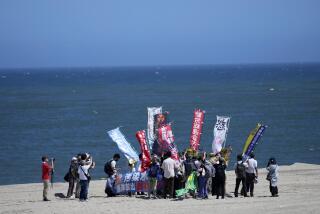New Zealand’s Concerns About Nuclear Weapons
- Share via
More than 20 years ago the United States tested a nuclear device at a very high altitude over the South Pacific. Unexpectedly a weird and frightening glow appeared high in the ionosphere, and was seen thousands of miles away in New Zealand, causing a profound feeling unease to all of us who saw it.
For the first time in their lives, the people of my country saw a visible indication of the capacity for global catastrophe inherent in nuclear weapons. It was a passing fear, since this was probably one of the last atmospheric tests by the United States, after mounting world pressure compelled both it and the Soviet Union to cease the alarming escalation of atmospheric tests of 100 megaton bombs.
However, France’s Charles de Gaulle and his successors continued atmospheric testing in the South Pacific--in fact they were only persuaded quite recently to carry out their tests underground. During the early 1970s New Zealand’s then Labor government protested by sending a frigate into the French restricted testing area, and simultaneously presented a case against the French tests in the world court.
Independent protests involving New Zealanders also took place, and were greeted with widespread support in New Zealand--though the French authorities in Tahiti rounded them up with the expected rough handling of both crew and boat. Similar private protests have continued, as the French have continued to test their bombs in the South Pacific.
The effect of this continued testing in our “backyard” and that of other Pacific island states has generated an anti-nuclear consciousness that would seem astounding by American standards, or even those of Europe.
Added to this came the increasingly insistent suggestions by the United States that is nuclear-armed or nuclear-propelled ships would be welcomed in our ports. Our previous conservative government let them come, but not frequently. Every visit has been greeted by storms of protest, usually in the form of huge numbers of small craft attempting to block the entry of the nuclear juggernaut. The issue is not really one of safety of the nuclear-propelled vessels, but rather one of power. That the first visit caused protest was probably expected, but it was probably hoped that we would gradually get used to the idea, and eventually accept a U.S. base in one of our harbors. In fact no such thing happened. The continued flaunting of the symbols of nuclear machismo inflamed anti-nuclear public opinion.
By the time of the July 1984 election most of the country had had enough. For example, the majority of city councils and two councils had passed formal resolutions declaring themselves to be nuclear-free zones--a symbolic stance, since they have little power or opportunity to enforce it.
However, those who voted for these nuclear-free zones were not hotheaded leftists, but ordinary New Zealanders, often of quite a conservative disposition. This is now the mainstream in New Zealand. In fact, the last government fell because one of their members declared her refusal to support a pro-nuclear ships policy. Sir Robert Muldoon called an election and the opportunity to change the government was embraced enthusiastically.
The new government has now taken all the steps New Zealanders knew it would have to take if the United States forced the issue, and I can’t see that there will ever by any reversal under a government of any kind of political persuasion.
The Reagan Administration is clearly upset, not so much by the denial of port access itself, but because our country, which has so much in common with the U.S.A., is seen to present a protest against the arms race with which the people of the U.S.A. can easily identify.
The message from New Zealand is quite clear: the South Pacific Ocean may or may not be of strategic significance to those who see themselves as big powers, but it is where we live and we think it is time they did something more constructive with their differences than come to where we live to trade threats with each other.
C.W. GARDINER
Pasadena
Gardiner is a physicist at the University of Waikato at Hamilton, New Zealand, who is now on the visiting faculty at Caltech.
More to Read
Sign up for Essential California
The most important California stories and recommendations in your inbox every morning.
You may occasionally receive promotional content from the Los Angeles Times.













